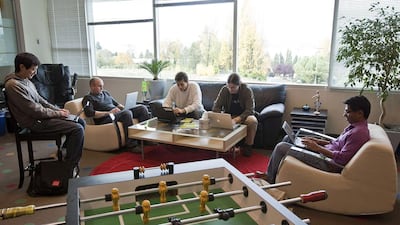It is thought that happy employees improve the performance of a company. This has been championed most publicly by Google, with its large assortment of toys, break rooms, food and beverages, services and transport for employees.
But is this concept correct?
Although it is relatively clear that unhappy employees would be harmful to a company, this does not necessarily imply the opposite. And it is even less clear that just giving workers goodies will bring them joy, either.
_____
This article is part of our supplement on happiness, which unites us all. For more happiness stories visit our dedicated page.
_____
Angus Deaton, who last year won the Nobel Prize in economics, and Daniel Kahneman, who won the award in 2002, published a paper that concludes that increases in happiness level out once an individual reaches annual earnings of US$75,000 (Dh275,400).
With that in mind, Dan Price, the chief executive of start-up Gravity Payments, decided last year to pay everyone in his company the same salary – even reducing his own $1.1 million salary, to $70,000.
The result was chaos. Employees who were already making $70,000 suddenly found junior employees being paid the same but with far less responsibility. Two quit due to what they saw as unfair compensation practices. Price’s brother, the only other shareholder in the company, sued.
If giving employees more cash creates such friction, then directly providing the extras that would be bought with the same cash – as in the case of Google – is not likely to provide happiness, either.
In reality, the best way to increase productivity in a company is to remove politics. Nothing destroys employee morale and performance more than corporate politics.
Workplace politics is a form of manipulation by projecting an image that is not true, or does not give the true picture. Describing a few of the more popular games people play in the office will not only illustrate politics but also why it destroys performance.
Taking credit for the work of another employee is one. Often it takes the form of a line manager taking credit for the work of a subordinate. The subordinate will, sooner or later, stop performing without recognition and reward. Indeed I know of more than one employee who even began deliberately inserting errors into their work to get a boss into trouble.
Another insidious game is attacking a rival by attacking his or her reputation. This is usually done by a form of targeted gossip. The reason this is destructive is because the rival clearly is the better performer and the politician, being a lower performer, has to use politics to attack his rival.
The last example that I will give is of the corporate bully. Such a person derives authority from fear rather than respect. There are many tools available for the bully but the main one is isolation, specifically to ensure that the target of the bullying is not able to perform.
Ultimately, a person’s unhappiness at losing $1 is greater than their happiness at gaining $1. Similarly it is clear that a person being tortured becomes much happier when the torture stops than a person gaining $1 million. The same principle applies in the office: increased productivity and a healthy workforce are not achieved by adding positive things but by removing negative ones.
Sabah Al Binali is an active investor and entrepreneurial leader with a track record of growing companies in the Mena region. You can read more of his thoughts at al-binali.com.

